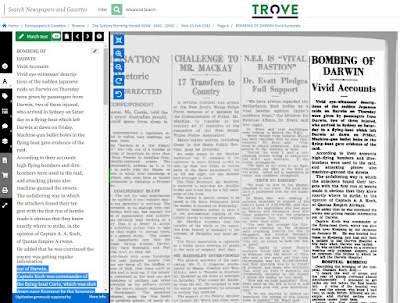HOSPITAL BOMBING.
Describing the bombing of the hospital, Captain Koch said :—I heard the wail of sirens and the roar of planes overhead almost simultaneously. I managed to get under my bed before the first bombs fell. A wing of the hospital was hit, and the nurses, who knew, I had been in raids before, followed my example, and started getting other patients under their beds.
"After the first shock was over they started getting patients down to the beach, about 200 yards away.
A doctor and nurse helped me to the shelter of some bushes, and covered me with a mattress. We could hear bombs falling in other parts of the town. A doctor was in the middle of an appendix operation when the raid began, but I don't know what happened to the patient."
Captain Koch said that he saw men swim ashore from ships in the harbour, and one man had his lungs badly injured by concussion from a bomb that fell near him in the water. He said that bombs of about
500 lb. were dropped from high levels, dive-bombers were used, and the streets were machine-gunned in the raids.
Captain H. B. Hussey and Captain A. H. Crowther were probably responsible for saving the flying-boat which was at anchor in the harbour at the beginning of the raid.
"I was waiting in the barber's for a haircut when I heard the sirens wail."
I had to dodge pieces of falling stone and masonry which were hurled high into the air by explosions.
A piece of heavy lead piping from the post office, which received a direct hit, landed near me. People
bung themselves into the gutters for shelter.
"As soon as the fall of bombs ceased Captain Crowther and I made our way to the wharves. Dense smoke screened the flying-boat from the attackers, although bombs were dropped between it and a ship again and again."
Captain Hussey said he found the launch and with Captain Crowther made his way out to the flying-boat which to their surprise they found intact. "We clambered on board and found the engineers had left the engines in flying order. We taxied away, and across the water we examined the hull to see if it had been damaged by concussion.
"We could still hear bombs falling so we decided to try and save the plane. We took off and flew down the coast and did not return till dusk, when we considered it safe. We worked on the plane and loaded it all night and left at dawn the next day."
Mr. Ruddman, a boarding-house manager in Darwin, declared that he thought Darwin was taken by surprise by the raid.
'No one seemed to know whether the sirens sounded first or whether the crash of bombs was the first warning that we were being raided,' he said.
Mr. Ruddman paid a special tribute to crews of the anti-aircraft guns, who, he said, did a marvellous
job.
"They never ceased blazing away with their guns even when the enemy came down to within a couple of hundred feet. They certainly were game," he added: "So were the civilians. They proved that
Australians can 'take it,' too." A small child had a very fortunate escape from serious injury on Mon- day afternoon, when, he threw himself under a utility truck, moving We understand that the truck passed over the child, but he was untouched by the wheels, and escaped with minor injuries as a result of striking the roadway.




Comments
Post a Comment